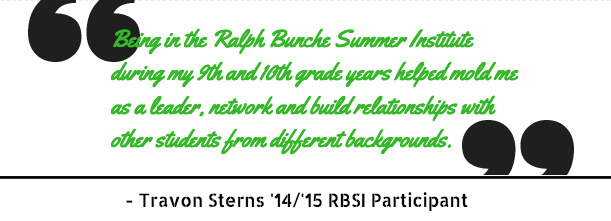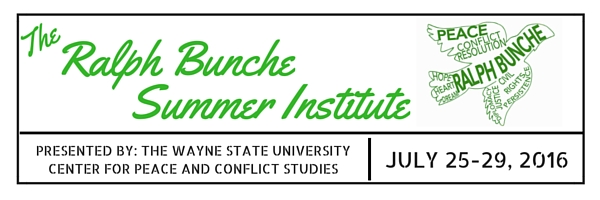Center for Peace and Conflict Studies presents Ralph Bunche Summer Institute 2016 Program
The Center for Peace and Conflict Studies and the Damon J. Keith Center for Civil Rights at Wayne State University will host the 2016 Ralph Bunche Summer Institute from Monday, July 25 to Friday, July 29. The program will be held each day from 8:30 a.m - 4:30 p.m. for high school sophomores, juniors and seniors (in grades 10, 11, and 12 only) on Wayne State University's campus.
The institute is a one-week training program that provides Detroit-area youth with development services focused on civic engagement, conflict resolution intervention, violence prevention, bullying, diversity, civil rights, race relations, negotiation, leadership, international affairs, diplomacy, social justice and crucial life skills to individually and collectively foster peace within their schools and communities. During the program, the students will also stay overnight in Wayne State's Towers Residential Suites on Wednesday, July 27.
"Being in the Ralph Bunche Summer Institute during my 9th and 10th-grade years helped mold me as a leader, network and build relationships with other students from different backgrounds. I became more knowledgeable and involved in violence prevention initiatives in my school, and I'm thankful for the experience," said Travon Sterns, a 2016 graduate from Osborn High School.
The program is designed to prepare high school students to make positive contributions to local, regional, national and global society. On the final day, students will make a social justice presentation to community members demonstrating the solution-based principles they have acquired from the program. Learning outcomes are directly tied to active listening skills, communication skills, teamwork, organization and activism, critical thinking, cultural sensitivity and diversity training, presentation, data collection, and fact-finding and research skills. More importantly, students develop skills in peaceful conflict resolution and are trained in non-violently diffusing and de-escalating conflicts.

View the video of last year's program
"The urgency to deliver this training to young people in Detroit and the surrounding areas is our top priority. Our youth are not equipped with the life skills of utilizing conflict resolution and/or negotiation skills to diffuse disputes, which could effectively minimize the levels of violence they face within their schools and communities every day," said Barbara L. Jones, Wayne State CPCS community dispute resolution specialist and program director of the summer institute. "At this time, there is no general education curriculum in schools that gives them basic tools to peacefully resolve conflict."
The program is also designed to be accessible to all students.
"Our campus and community partners are committed to investing their time, resources and funding so students and their parents are not faced with a financial hardship in order for them to attend," Jones added. "The program is free. The program presents the opportunity for youth to interact with each other across cultural and racial lines, interact with other school districts, promote listening and understanding."
About the Ralph Bunche Summer Institute
The Ralph Bunche Summer Institute was created in 2001 in honor of Dr. Ralph J. Bunche, a native Detroiter who personified the quest for education, communication, negotiation, understanding and peacemaking among the world's people. These skills are sorely needed and are in demand with our youth during times of misunderstanding and violence in Detroit, across the United States and abroad. After a career in higher education and a pioneering role in the U.S. civil rights struggle, Bunche went on to mediate the first Arab"Israeli ceasefire accords in 1949 and then represented the United Nations as Under"Secretary-General in the numerous crises arising from the decolonization process, including the Congo. For his Middle Eastern diplomacy, he became the first person of color to win the Nobel Peace Prize, which he accepted on behalf of the United Nations. His skills in diplomacy, conflict resolution and diversity are crucial to today's youth.
